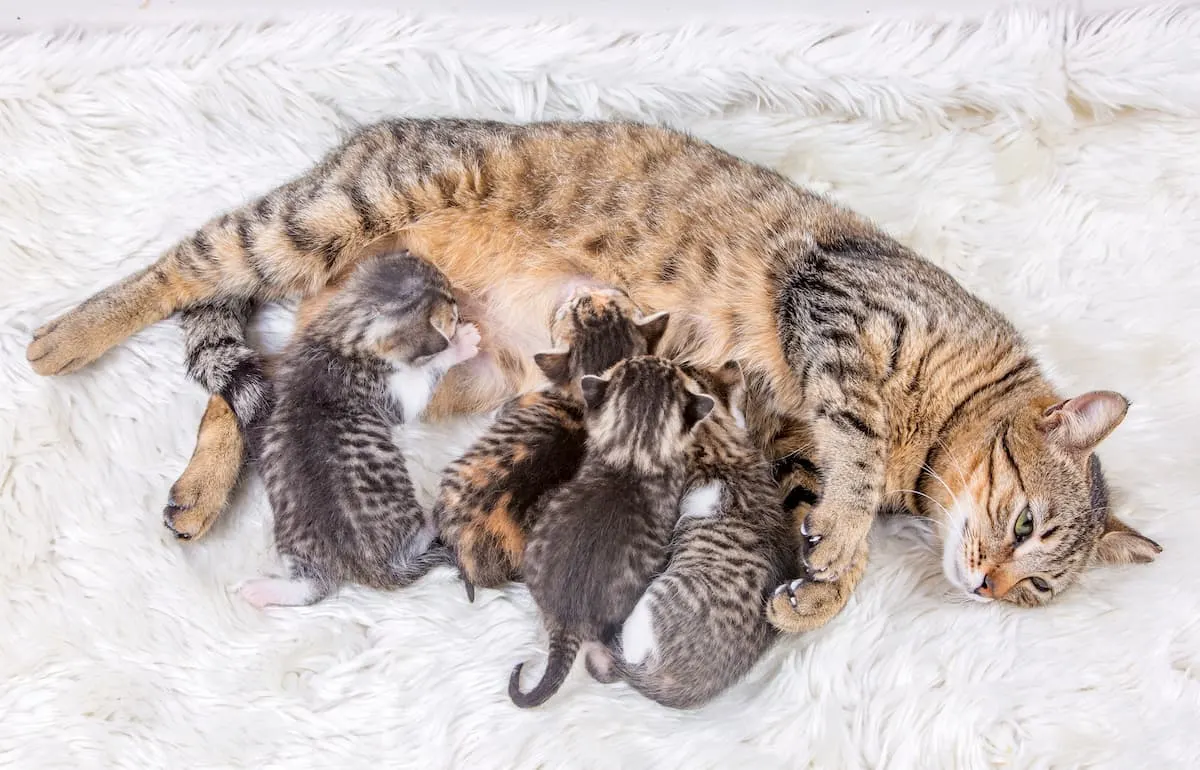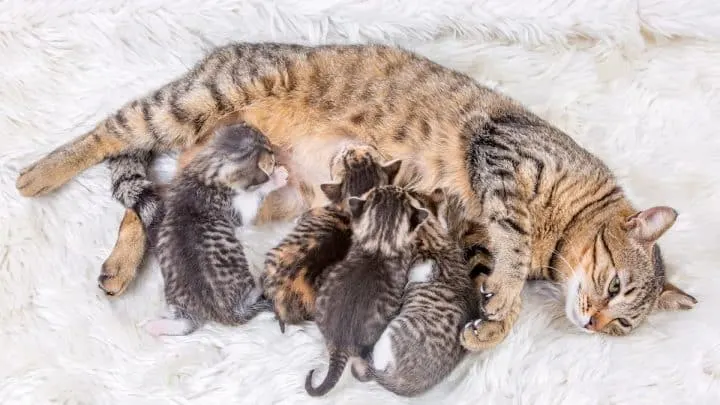It’s normal to be excited when you’re caring for a cat that’s expecting kittens. After all, a pregnant cat means kittens are on the way, and who doesn’t love a cute litter of kittens! Of course, pet parents expecting cats probably have many questions when it comes time for the actual birth. what can you expect? Can your cat be in labor for more than one day? What if she’s already had at least one kitten but is still acting like she’s expecting more? Can cats give birth days apart?
Yes, cats can give birth days apart. Some cats will also go into labor, have several kittens, and then not give birth to another kitten for many hours. In rare cases, cats can experience paused labor which can lead to two different birthdays for the same litter of kittens.
Birth is particularly stressful on your cat’s body, and if she’s naturally not laboring, there may be a good reason. Of course, birthdays aren’t the only thing you should worry about when it comes to a cat giving birth. Here are a few other things you should consider.

Can A Cat Give Birth 24 Hours Apart
Yes, cats can give birth 24 hours apart. Kittens being born truly 24 hours apart would be rare, but it’s not impossible. Cats can have interrupted labor, where they start laboring to have a kitten and stop.
Sometimes interrupted labor will happen before any kittens are in the birth canal. Still, more commonly, interrupted labor will happen after your cat has already given birth to at least one kitten in her litter.
Unless your cat shows signs of distress or unusual fatigue, interrupted labor is normal and nothing to worry about.
Just keep an eye on your cat and be ready to take her to the vet if she shows signs of distress, abnormal bleeding, or any other birth complications. Chances are she’ll go back into labor very naturally on her own and have the rest of the kittens when she’s ready.
How Far Apart Can Kittens Be Born
Cats that have interrupted labor have had kittens as far apart as 36 hours, but that isn’t common. Most kittens are born within 10 minutes to an hour of each other, and cats have an average litter size of 4 kittens.
Of course, cat litters can be up to 12 kittens, and interrupted labor can mean long gaps between births in some cases.
Can A Cat Give Birth And Still Be Pregnant
Yes, a cat can give birth and still be pregnant.
As confusing as it might be, momma cats don’t always give birth to their entire litter in one go. They might not even go into labor for the next kitten right after they have the first, which can lead to long birthing times and a still-pregnant cat between kittens.
That means that it’s essential to monitor your momma cats as they give birth. They might not be comfortable with you being right in the room the whole time, but you should check them frequently to monitor where in the birth process they are, how many kittens they’ve had, and if they appear to have any more kittens on the way.
Monitoring during birth is also crucial since cats can have birthing difficulties that need vet attention, and kittens can be born with health issues. Unfortunately, some kittens may even be born stillborn, which can upset their mothers and lead to complications with the rest of the litter.
The sooner you can notice any problems or complications with your birthing cat, the more likely it is that you’ll be able to get her and her kittens potentially lifesaving care.
How To Tell If Cat Still Has Kittens Inside
Most of the time, cats will give birth to their kittens, and all is well, but every once in a while, a cat will have interrupted labor, and not all the kittens will be born at once.
Momma cats may also run into birthing difficulties where one of the kittens gets stuck, which is very dangerous for both the momma cat and her kittens, so it’s important to know what to look for.
A kitten that is still in the womb usually can’t be seen, and its mother might not act at all distressed about it. You can check for kittens by gently pressing on your cat’s belly; you’ll be able to feel small lumps for any kittens still in her womb.
Momma cats will usually show signs of distress if they are having any birthing difficulties. They’ll likely start to lick their rear end and may cry or act worried.
Some cats will even run around like they are playing or scared. If your cat shows any of these signs, call a vet right away. Ideally, an emergency vet will walk you through the next few minutes so you can help your cat while another vet is on the way.
Sometimes a kitten will be visible, especially a paw or their nose, before they’ve been born. If that happens, your cat needs to give birth quickly for the health of both mother and child. It should only take a few minutes for your kitten to be born at this stage, but you need to call a vet if it takes any longer.
What Happens If A Kitten Gets Stuck In The Birth Canal
In some cases, vets can help a cat birth her kitten naturally, even after it’s gotten stuck in the birth canal. That has to happen quickly, though, since both mother and kitten may be injured or even die if the baby is stuck for too long.
If the vet fails in helping your cat give birth vaginally, they may recommend switching to a cesarean birth to help both the mother cat and her kitten.
A cesarean birth may be necessary in rare cases even if it can’t save the kitten since it might save the mother cat and any other kittens still in her womb.
How Do I Get My Cat To Push Her Kittens Out
For the most part, it’s not a good idea to try and induce labor in your cat at home. If your cat is overdue or there are complications with her pregnancy, it’s best to leave the decision of what to do next to a qualified vet.
However, once your cat has started labor, there are a few ways you can help.
For one thing, please pay attention to her. Your cat will likely start to avoid you right before she’s ready to give birth. That’s one of the first signals that it’s time to make a comfortable place for her to give birth, and make sure you have supplies on hand to help out with the kittens if she needs it.
Have rags, kitten formula, and wet food for your new mother cat on hand. Chances are you won’t need the kitten formula unless your cat has a large litter, but it’s better to have it and not need it than to need it and not have it.
If your cat seems distressed after she has gone into labor, seems to start labor and doesn’t produce a kitten within 2 hours, or starts licking her rear end without giving birth, it’s likely time to call a vet and get some help.
Things To Consider
While the average litter has four kittens, some litters can have as many as 12, and it’s best to be prepared for more than you expect. Even vets sometimes miss a kitten or two in the womb.
It’s also important to be responsible with your cats. While having kittens can be exciting and rewarding, most cats shouldn’t have kittens. That’s because cats are already very overpopulated, and there aren’t enough good homes for the cats we already have. As much as possible, we should leave breeding to cats living in the wild and reputable breeders that know how to breed healthy cats.
If your cat is pregnant and you aren’t prepared for the kittens, please consider rehoming your cat to someone who can care for them or getting your cat fixed.
Most vets are willing to spay a cat in the earliest stages of pregnancy, which will abort the kittens and help your cat stay healthier and more like her old self. It’s a difficult decision, but sometimes a necessary one.

My name is James, and welcome to FAQCats!
Along with our team of cat owners, expert pet enthusiasts, and pet professionals, we aim to write engaging helpful, engaging content about cats. At FAQCats we strive to provide content that’s accurate and fun to read. Our team writes about everything related to cats; even the most complex of topics. Through extensive research and caring for our own fur-pals, we’re able to provide something cat owners worldwide will love. Have a look around, and leave us feedback anytime!

